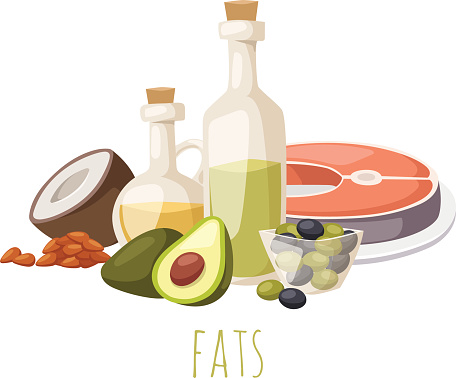Know Your Fats

Fats have often gotten a bad rap but as we learn more about their role in nutrition, it’s clear that not all fat is bad—in fact, some fats are necessary and beneficial to our health. We now know that good fats give us energy, build cells, and help to balance hormones. They can also help us feel more satiated, which can prevent snacking and aid weight loss. Fats may even help to lower cholesterol levels. So, rather than adopting a low-fat diet or avoiding fats entirely, it’s best to focus on the types of fat you’re eating.
What Are Fats?
Dietary fats (also known as fatty acids) are found in plants and animal products. Although some fats are an important part of a healthy diet, certain types have been shown to have a negative impact on health. For this reason, fats are categorized into “good” fats and “bad” fats.
Although all fats have a similar chemical structure, they have different physical properties that can help you identify them. Bad fats tend to be solid when they’re at room temperature (like butter and lard), while good fats are liquid at room temperature (like nut and vegetable oils). Good and bad fats affect cholesterol levels differently. Bad fats will raise LDL cholesterol (aka bad cholesterol) while good fats help lower LDL levels when they’re eaten as part of a healthy diet. Regardless of the type of fat, all contain nine calories per gram.
When food manufacturers create reduced-fat products, they often replace the fat with carbohydrates from sugar, refined grains, or other starches. Although this makes foods more flavorful, our bodies digest these refined carbohydrates very quickly, which impacts blood sugar and insulin levels and may result in weight gain or disease development over time.
Bad Fats
Bad fats include trans fat and saturated fat, both of which have been shown to be harmful when eaten regularly.
Trans fat is created as a byproduct of hydrogenation, which is used to turn good fats into a solid to prevent them from going rancid. Trans fats do more than just increase LDL levels and lower HDL (healthy cholesterol) levels. They’ve also been shown to contribute to insulin resistance and create inflammation, which has been linked to a number of chronic health conditions, including heart disease and diabetes.
Trans fats are very harmful. Research has shown that for every 2% of trans fat calories consumed daily, the risk of heart disease goes up by 23%.
Saturated fats are naturally found in many foods, primarily animal products like beef or pork fat, lard, cream, butter, whole or reduced-fat milk, and cheese. Many types of baked good and fried foods also contain high levels of saturated fats, as well as some plant-based oils like palm or coconut oil.
Trans fats should always be avoided, while saturated fats should be eaten sparingly.
Good Fats
Good fats are as essential to your diet as protein and carbohydrates. Not only do they help supply the body with energy, but they also support certain bodily functions. For example, some vitamins require fat to dissolve into your bloodstream and provide nutrients. Good fats include monounsaturated fat and polyunsaturated fat and are mainly found in vegetables, nuts, seeds, and fish.
Some good sources of monounsaturated fats are olive oil, peanut oil, canola oil, avocados, high-oleic safflower oil, sunflower oil, and many types of nuts. There’s no recommended daily intake of monounsaturated fats, however, the Institute of Medicine recommends using these fats as a replacement to trans and saturated fats as much as possible.
Polyunsaturated fats can be thought of as “essential fats.” These are fats that your body needs to function properly, but can’t create itself. Polyunsaturated fats aid muscle movement, blood clotting, and inflammation. They’re also needed to build cell membranes and nerve coverings. The only way to get these essential fats is through your diet. There are two main types of polyunsaturated fats: omega-3 fatty acids and omega-6 fatty acids. Both offer important health benefits.
Omega-3 fatty acids reduce blood pressure, raise HDL levels, and lower triglycerides. They may help prevent (and possibly treat) heart disease, stroke, and lethal heart arrhythmias. Evidence suggests they may reduce the need for steroids for those with rheumatoid arthritis; other studies claim a wider range of health benefits, such as reducing the risk of dementia, although these claims have yet to be substantiated. Some good sources of omega-3 fatty acids include fatty fish, like salmon, mackerel, and sardines, as well as flaxseeds, walnuts, canola oil, and unhydrogenated soybean oil.
Omega-6 fatty acids have also been shown to have heart-health benefits that may protect against heart disease, as well as lowering LDL and increasing HDL levels. Some examples of foods that are rich in omega-6 fatty acids are tofu, seed and nut oil, vegetable oils, and liquid or tub margarine.
Personalized Weight Loss Plans
Eating a balanced diet is the best way to support your heart health and meet your weight loss goals. Whenever possible, make sure your daily fat intake is coming from monounsaturated and polyunsaturated fats, and keep your saturated fat intake to a minimum. Trans fats should be avoided completely. The majority of your calories should be coming from fruits, vegetables, fish, legumes, nuts, and low-fat dairy products.
Dr. Hubert can work with you to create a personalized weight loss program to help you stay on track. Typically, professional weight loss programs are more effective than managing weight loss on your own. With Dr. Hubert’s expertise, you’ll have a higher chance of success in losing unwanted weight and keeping it off. Contact Dr. Hubert today to schedule your consultation.